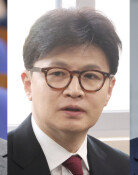[Opinion] Was 6.25 Really an Attempt at Unification?
[Opinion] Was 6.25 Really an Attempt at Unification?
Posted October. 13, 2001 09:03,
![[Opinion] Was 6.25 Really an Attempt at Unification?](https://dimg.donga.com/egc/CDB/ENGLISH/Article/20/01/10/13/2001101317938.jpg)
Was 6.25 a `failed attempt at unification`? President Kim Dae Jung drew much criticism when he asked this question on September 29 for the Armed Forces Day memorial speech. Although the press reported on the speech briefly in the two weeks following, the reserve military organization, Sung Woo Hwae made a `public inquiry about President Kim`s views on 6.25`. Moreover, two opposition party members criticized the President`s views and raised a public uproar.
Cheong Wa Dae and the ruling party administration`s responded that the speech intended to underscore the need for peaceful reconciliation and unification, and that this intention should not be misunderstood or distorted. The event calls for a re-examination of 6.25 and surrounding historical circumstances. This requires first, an analysis of the speech, and second, the true historical circumstances of 6.25.
The original text of President Kim`s speech says the following: ``There has been three attempts at unification in our history. Shilla and Koryo successfully unified the country. However, the third attempt in the Korean War was a failure. Yet, all three were attempts to unify the country by force. We cannot and must not make the fourth attempt by using force. It must be a peaceful effort. The South and the North both have large amounts of weapons of mass destruction. For the sake our people`s safety and future prosperity, we must pursue a peaceful unification.``
The earlier statements in the quoted passage basically means that a peaceful unification has to be built on the basis of technological and economic development, whereas the later statements stress the importance of technological and economic development and peaceful cooperation between the South and North. The ruling party used the statements specifically referring to the war and to peaceful unification to argue that the 6.25 was a failed attempt at unification.
When examined closely, however, the passages on 6.25 and statements on the historical context appears to be related but actually has little logical relation. There are two problems to the passage quoted. Even if we acknowledge that Shilla and Koryo kingdoms were actual products of unification, it is not at all clear whether 6.25 was a unification attempt, who started the war, and what actions qualify as attempts at unification. Whichever way we look at the issue, we do not know who initiated the unification attempt and whose actions qualify as such during 6.25. On this point, President Kim must clarify his position.
Let`s look at the historical facts of the war. There are many different views on the cause of 6.25 – President Sygman Rhee`s anti-Communist policy, power struggle between South and North, the revisionist account of US cold war containment policy against Soviet influence.
When we put aside the ideological bias and fiction, the truth of the matter is that 6.25 was a collaborative violation of international law by Stalin, Mao Tse Dong, and Kim Il-Sung which led to an illegal invasion of the South and a fratricidal war. When the historical truth that the war was an invasion of the South, North Korea justified the attack as a ``war for the people`s liberation.``
Hence, interpreted 6.25 as the North`s unification attempt ends up changing the `war for the people`s liberation` into `unification attempt` and justifies the invasion. If the South had tried to unify the country by force, the South would be guilty of illegally attacking North Korea. If the South broke through the 38th parallel during the counterattack and overtook the North by force, that would be considered logically and historically reasonable. The goal of UN and US plans to break through the 38th parallel was initially unclear but it ultimately brought about an opportunity for unification. Yet, even that was not the original intent but only the result of a back-up plan.
Looking at the situation this way, President Kim must offer a personal explanation of his inappropriate statements after absorbing and resolving the people`s suspicion, anxiety, and anger. Even if the people and the opposition party members misunderstood or distorted the original intention, it is the President`s responsibility to correct the situation.
Yoo Jae-Kap (Kyongki University, Dean of College of Communications, International Political Science Department)







